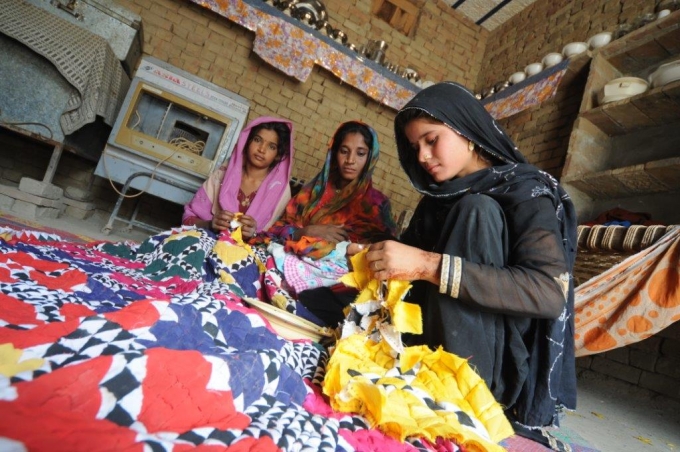News Analysis |
According to a survey conducted by Punjab Commission on Status of Women in rural areas of the province only 56 percent of young women have Computerized National Identity Cards (CNICs). The survey revealed that compared with rural peers, urban women have 64 percent of CNICs of women age 18 years and above. Fewer CNICs were issued to women in Punjab (41 percent) as compared to men (59 percent), it said.
Moreover, about political awareness and participation of women the survey points out that in General Election 2018, 69 percent of all young women had voted, compared to 32 percent in the elections of 2013.
Honor killing has become almost a norm in many parts of Pakistan where women are treated as a commodity and whose sole responsibility is to be submissive guardians of men’s honor and ego.
The survey stressed that the NADRA should actively seek to eliminate the gender gap in the issuance of CNICs and voter registration through extensive outreach campaigns, especially in high schools and colleges.
Need for Favorable Social Settings
In Pakistan, women are generally kept away from the public sphere and have to face domestic violence and psychological torture on a daily basis. It is believed that without developing favorable social settings, the idea of political empowerment of women shall remain highly contested.
Domestic Violence in Pakistan
Pakistan ranks 150 out of 153 countries on The Georgetown Institute’s Women, Peace and Security index ─ among the five worst countries for women in the world. According to 2016 data, 26.8 percent of Pakistani women said they have experienced intimate partner violence.
Read more: One in every three women in Punjab suffered violence: UNFPA
According to another report of the Aurat Foundation, Pakistan is a country where almost 70 percent of women are victims of domestic violence, at least once in their lives. This violence is generally committed by their intimate partners—husbands. These figures, however, do not include psychological violence, which is even more common in urban communities.
One in every three women in Punjab aged between 15 and 64 years has suffered violence, according to a survey conducted by the United Nations Population Fund (UNFPA). The survey funded by the UK’s Department for International Development (DFID) was first of its kind in Pakistan in collaboration with the Bureau of Statistics and the Punjab Commission on the Status of Women.
If a girl, for example, refuses a marriage proposal of a man or any other demand for any stated or unstated reasons she, by doing so, insults the man and hurts his ego.
Legal Protection Mechanisms
Pakistan has passed several laws to protect women across the country. But data shows that the cases are increasing with the passage of time despite the presence of a legal mechanism of protection.
Although in the province of Punjab a law The Punjab Protection of Women against Violence Act 2015 has been passed yet there are numerous cases of violence against women in the province. According to a report of the Human Rights Commission of Pakistan (HRCP), which put the number of honor killings between June 2017 and August 2018 at 737.
The total number of such murders since the organization started keeping records in 2016 stands at 15,222. Honor killing has become almost a norm in many parts of Pakistan where women are treated as a commodity and whose sole responsibility is to be submissive guardians of men’s honor and ego.
Read more: How to protect women against violence in Pakistan?
Experts and researchers suggest that in Pakistan’s social setting like many other developing polities there is a complex and rigid concept of power. Violence against women, like rape, is a demonstration of power and strength. It should, therefore, be understood from a sociological perspective which helps understand the context in which these incidents take place. If a girl, for example, refuses a marriage proposal of a man or any other demand for any stated or unstated reasons she, by doing so, insults the man and hurts his ego.
What Needs to be Done?
Dr. Rafia Zakaria while proposing a solution argues that “the answer, perhaps, lies in changing the debate and acknowledging that trickle-down feminism is not working to end honor crimes. If communities are clinging to these horrific practices as a means of highlighting their continued power against a modernizing world, then the way ahead may hinge on change at the community level, involving the very people who are now wielding power in tribal jirgas and other grassroots justice mechanisms.”
In most cases, these negotiations to find acceptability for situations that are locally unpalatable can take weeks or months and intervening layers of institutions have to be trained for that.
Analysts believe that by developing a comprehensive mechanism of conflict resolution may help Pakistan to get rid of it. Prominent TV anchor and columnist Dr Moeed Pirzada offered an interesting solution in an article he wrote almost two years ago.
“Police, local political elite and lower judiciary – most of whom themselves are convinced of the value of ‘honor’ — need to be trained to understand these conflicts in the context of modernity and to be able to help institutions like Darul Amman, local councils and government-approved local bodies to find solutions.
In most cases, these negotiations to find acceptability for situations that are locally unpalatable can take weeks or months and intervening layers of institutions have to be trained for that. This is what their capacity building is about.
Read more: Mahwish Arshad’s case: Violence against women is a demonstration of power
And perhaps most importantly media and educational institutions need to change the narrative; with the help of cell phones and books we need to spread the message around that young adults have the right to make their choices in love – and this includes the right to make painful blunders. And there is no family ‘dishonor’ in matters of heart,” he argues.














